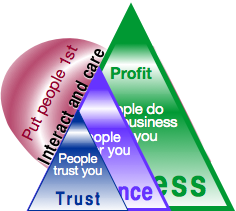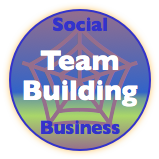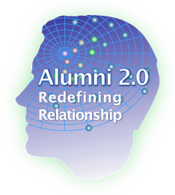 Ethnographic research for social media initiatives shows how ethnography can change the rules of social media programs in marketing, customer service, product development, recruiting and others. Ethnographic research enables teams to understand the people who are most important to your firm so they can relate to them at a completely different level. Moreover, interacting in digital public activates the network effect and the annuity effect, so it’s very scalable. Since your teams interact in digital public, where a far larger group of like people observes the interactions, they influence a large group of people and build relationships with them. People start trusting your firm, preferring your firm, and doing more business with you. See the Trust Business Chain Reaction and infographic for how it monetizes. Ethnographic research for social media initiatives shows how ethnography can change the rules of social media programs in marketing, customer service, product development, recruiting and others. Ethnographic research enables teams to understand the people who are most important to your firm so they can relate to them at a completely different level. Moreover, interacting in digital public activates the network effect and the annuity effect, so it’s very scalable. Since your teams interact in digital public, where a far larger group of like people observes the interactions, they influence a large group of people and build relationships with them. People start trusting your firm, preferring your firm, and doing more business with you. See the Trust Business Chain Reaction and infographic for how it monetizes.
Ethnographic research for social media initiatives is a game-changer for customer experience and digital transformation programs in multiple phases. It’s faster, less costly, and scalable. It provides an unprecedented combination of qualitative and quantitative research.
[…]
 The Trust-Business Chain Reaction How Trust Monetizes describes one of the most disruptive and untapped forces in business, for it shows how trust monetizes at scale. Firms that act on it first can create exceptional advantage for themselves since the reaction grows geometrically. Here is how the reaction works—and how experiential social media activates it. The Trust-Business Chain Reaction How Trust Monetizes describes one of the most disruptive and untapped forces in business, for it shows how trust monetizes at scale. Firms that act on it first can create exceptional advantage for themselves since the reaction grows geometrically. Here is how the reaction works—and how experiential social media activates it.
The Trust-Business Chain Reaction significantly increases profit and other business results in a surprisingly simple human way. It directly addresses customer experience and employee engagement.
[…]
 [UPDATED] Several times over the past few years, I have been contacted by major brands to advise them on finding a “social media executive” to help them “figure out social media” and “create a strategy.” In 2012, many firms began building social media teams in earnest, and this trend will continue to grow in the years ahead. Firms are also bringing “social media work” inside after having outsourced it to agencies. All of my client work has involved helping clients to build social business competency and teams, so here I’ll offer some pointers for how to build teams and avoid the pitfalls most companies experience. [UPDATED] Several times over the past few years, I have been contacted by major brands to advise them on finding a “social media executive” to help them “figure out social media” and “create a strategy.” In 2012, many firms began building social media teams in earnest, and this trend will continue to grow in the years ahead. Firms are also bringing “social media work” inside after having outsourced it to agencies. All of my client work has involved helping clients to build social business competency and teams, so here I’ll offer some pointers for how to build teams and avoid the pitfalls most companies experience.
Although each organization’s culture is different, the CEO, CDO, CMO or CAO will be happier with the social business investment if s/he doesn’t invest far ahead of return on investment, which remains low at firms that insist on “business-meaningful” metrics, not the PR- or “brand-building” variety. It’s a chicken-and-egg challenge: how do you know what kind of team to build until you’re achieving real business-meaningful returns on your social business initiatives?
[…]
Using the Relationship Value Map to Optimize Your Social Networks is a step-by-step approach to prioritizing your firm’s interactions in social networks to significantly improve the return on your team’s time.

CSRA’s Relationship Value Map is a simple but invaluable tool you can use to organize your social networks to meet your personal or business goals better. Its Interest and Trust vectors intersect to create four quadrants for your connections. I designed it when working with individual executive clients in 2009, but CSRA uses it with enterprise clients as well, especially those with direct (B2B) sales forces who need to prioritize their relationship building activities.
[…]
Evolving National-Global Recruiting and Sales with Social Business shows how firms can increase quality of recruits and sales leads while cutting costs.
 Social networks can help organizations, whether commercial, nonprofit or government, to significantly improve their efficiency in business processes like recruiting, sales and service. This is what we call “Enterprise Process Innovation” because, by using social networks to create and nurture relationships with alumni, your employees can diminish the time required to accomplish tasks within these processes. It’s well known that most alumni, former employees, move to firms that are related to your business (adjacent in the value chain) or complementary in some way. Yes, some move to competitors, but they are usually in the minority. Social networks, by significantly reducing the cost of having relevant, quality conversations, make robust employee-alumni networks actionable as never before. Social networks can help organizations, whether commercial, nonprofit or government, to significantly improve their efficiency in business processes like recruiting, sales and service. This is what we call “Enterprise Process Innovation” because, by using social networks to create and nurture relationships with alumni, your employees can diminish the time required to accomplish tasks within these processes. It’s well known that most alumni, former employees, move to firms that are related to your business (adjacent in the value chain) or complementary in some way. Yes, some move to competitors, but they are usually in the minority. Social networks, by significantly reducing the cost of having relevant, quality conversations, make robust employee-alumni networks actionable as never before.
[…]
Using Social Networks for Recruiting and Sales shows how firms can increase quality of recruits and sales leads while cutting costs.
 Social networks can help organizations, whether commercial, nonprofit or government, to significantly improve their efficiency in business processes like recruiting, sales and service. This is what we call “Enterprise Process Innovation” because, by using social networks to create and nurture relationships with alumni, your employees can diminish the time required to accomplish tasks within these processes. It’s well known that most alumni, former employees, move to firms that are related to your business (adjacent in the value chain) or complementary in some way. Yes, some move to competitors, but they are usually in the minority. Social networks, by significantly reducing the cost of having relevant, quality conversations, make robust employee-alumni networks actionable as never before. Social networks can help organizations, whether commercial, nonprofit or government, to significantly improve their efficiency in business processes like recruiting, sales and service. This is what we call “Enterprise Process Innovation” because, by using social networks to create and nurture relationships with alumni, your employees can diminish the time required to accomplish tasks within these processes. It’s well known that most alumni, former employees, move to firms that are related to your business (adjacent in the value chain) or complementary in some way. Yes, some move to competitors, but they are usually in the minority. Social networks, by significantly reducing the cost of having relevant, quality conversations, make robust employee-alumni networks actionable as never before.
All organizations (I’ll use “firm” to denote for profit, government and nonprofit) have business processes that benefit from relevant insight and introductions from other people: insight about the situation of the prospect, where the best sources of new […]
 Learning how to leverage social networks for business will be one of the top five requirements to thriving in 2009, and LinkedIn is an ideal place to begin because it helps to find opportunity: new customers, partnerships or jobs. The Executive’s Guide to LinkedIn has scheduled three new Collaborative Seminars in Chicago and Cleveland. Here is how participants increase their results: Learning how to leverage social networks for business will be one of the top five requirements to thriving in 2009, and LinkedIn is an ideal place to begin because it helps to find opportunity: new customers, partnerships or jobs. The Executive’s Guide to LinkedIn has scheduled three new Collaborative Seminars in Chicago and Cleveland. Here is how participants increase their results:
EGLI participants create their individualized LinkedIn plans They learn how to build their networks and manage their time according to the plan They learn how to use LinkedIn’s advanced tools […]
|
|
 Ethnographic research for social media initiatives shows how ethnography can change the rules of social media programs in marketing, customer service, product development, recruiting and others. Ethnographic research enables teams to understand the people who are most important to your firm so they can relate to them at a completely different level. Moreover, interacting in digital public activates the network effect and the annuity effect, so it’s very scalable. Since your teams interact in digital public, where a far larger group of like people observes the interactions, they influence a large group of people and build relationships with them. People start trusting your firm, preferring your firm, and doing more business with you. See the Trust Business Chain Reaction and infographic for how it monetizes.
Ethnographic research for social media initiatives shows how ethnography can change the rules of social media programs in marketing, customer service, product development, recruiting and others. Ethnographic research enables teams to understand the people who are most important to your firm so they can relate to them at a completely different level. Moreover, interacting in digital public activates the network effect and the annuity effect, so it’s very scalable. Since your teams interact in digital public, where a far larger group of like people observes the interactions, they influence a large group of people and build relationships with them. People start trusting your firm, preferring your firm, and doing more business with you. See the Trust Business Chain Reaction and infographic for how it monetizes.
 [UPDATED] Several times over the past few years, I have been contacted by major brands to advise them on finding a “social media executive” to help them “figure out social media” and “create a strategy.” In 2012, many firms began building social media teams in earnest, and this trend will continue to grow in the years ahead. Firms are also bringing “social media work” inside after having outsourced it to agencies. All of my client work has involved helping clients to build social business competency and teams, so here I’ll offer some pointers for how to build teams and avoid the pitfalls most companies experience.
[UPDATED] Several times over the past few years, I have been contacted by major brands to advise them on finding a “social media executive” to help them “figure out social media” and “create a strategy.” In 2012, many firms began building social media teams in earnest, and this trend will continue to grow in the years ahead. Firms are also bringing “social media work” inside after having outsourced it to agencies. All of my client work has involved helping clients to build social business competency and teams, so here I’ll offer some pointers for how to build teams and avoid the pitfalls most companies experience.
 Social networks can help organizations, whether commercial, nonprofit or government, to significantly improve their efficiency in business processes like recruiting, sales and service. This is what we call “Enterprise Process Innovation” because, by using social networks to create and nurture relationships with alumni, your employees can diminish the time required to accomplish tasks within these processes. It’s well known that most alumni, former employees, move to firms that are related to your business (adjacent in the value chain) or complementary in some way. Yes, some move to competitors, but they are usually in the minority. Social networks, by significantly reducing the cost of having relevant, quality conversations, make robust employee-alumni networks actionable as never before.
Social networks can help organizations, whether commercial, nonprofit or government, to significantly improve their efficiency in business processes like recruiting, sales and service. This is what we call “Enterprise Process Innovation” because, by using social networks to create and nurture relationships with alumni, your employees can diminish the time required to accomplish tasks within these processes. It’s well known that most alumni, former employees, move to firms that are related to your business (adjacent in the value chain) or complementary in some way. Yes, some move to competitors, but they are usually in the minority. Social networks, by significantly reducing the cost of having relevant, quality conversations, make robust employee-alumni networks actionable as never before. Learning how to leverage social networks for business will be one of the top five requirements to thriving in 2009, and LinkedIn is an ideal place to begin because it helps to find opportunity: new customers, partnerships or jobs. The Executive’s Guide to LinkedIn has scheduled three new Collaborative Seminars in Chicago and Cleveland. Here is how participants increase their results:
Learning how to leverage social networks for business will be one of the top five requirements to thriving in 2009, and LinkedIn is an ideal place to begin because it helps to find opportunity: new customers, partnerships or jobs. The Executive’s Guide to LinkedIn has scheduled three new Collaborative Seminars in Chicago and Cleveland. Here is how participants increase their results: